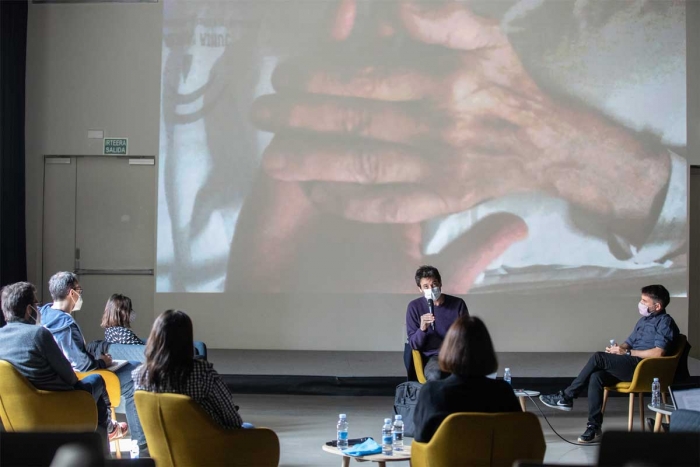This is the first issue of a newsletter that starts today and whose coming instalments will bring news of the area Z365 or 'Festival all year round'.
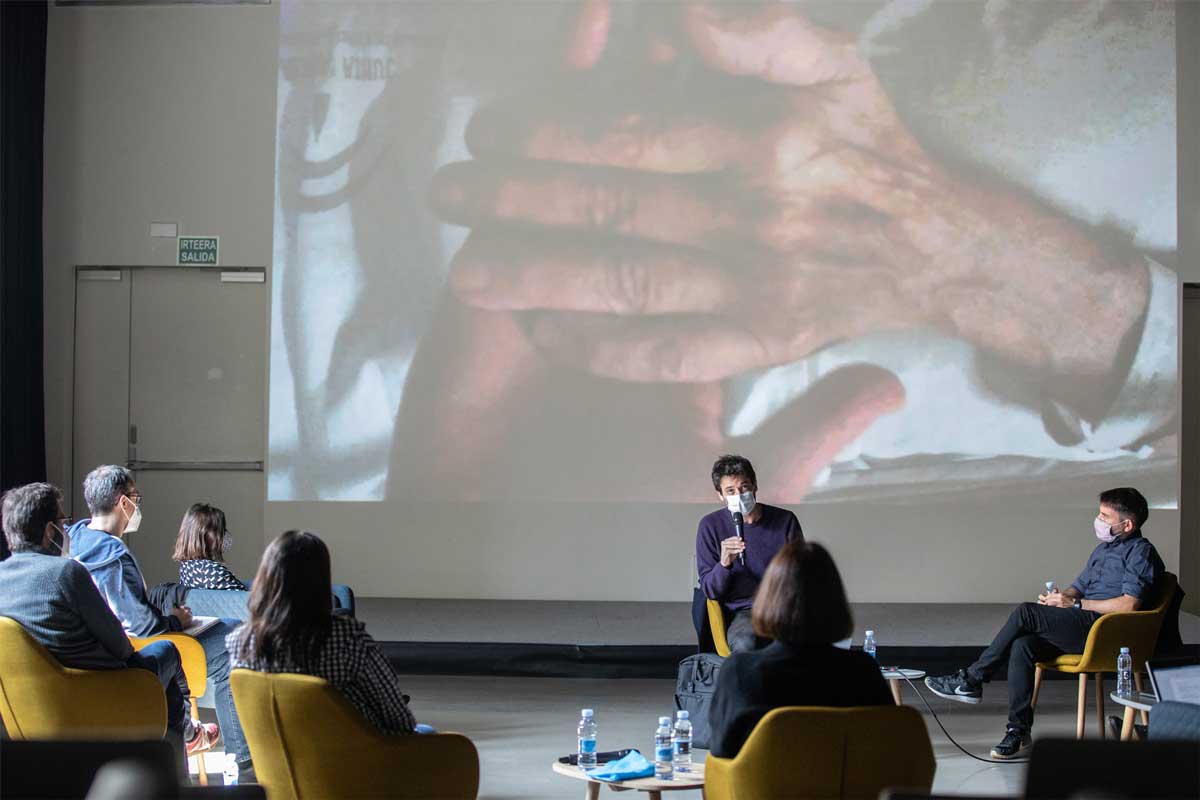
Manuel Muñoz Rivas at the presentation of projects from the seventh edition of Ikusmira Berriak.
But perhaps we should refer to it as issue 0 or as a pilot episode, like the audiovisual projects born with the intention of turning them into a series and whose presentation to the world for the first time seeks to convey their particular tone and universe, their plot and central conflict, as well as their starring actors and actresses.
These are, furthermore, usually episodes of longer runtime or duration in the endeavour to pave the way for things to come.
That said, the storyline of the Z365 pilot episode kicks off in 2015, when the Festival moved its offices into Tabakalera International Centre for Contemporary Culture, where it proceeded to coexist with its cultural projects and those of the Filmoteca Vasca.
For some time previously, the San Sebastian Festival had been rethinking itself and analysing the international situation of film festivals as a result of the proliferation of festival studies. This self-reflection, perhaps rather more theoretical and academic, sought to establish the place occupied by the San Sebastian Festival in that changing international festival circuit.
The creation in 2017 of the Elías Querejeta Film School, and the Festival's participation in its conceptualisation, ushered it even further along this new path. The event started to teach a subject going by the name of 'Festival under Construction' for post-graduate students taking the Film Curating course, offering them access to its historical archive and joining the school as leaders of the research project Zinemaldia 70: all possible stories.
For the first time in its history, the Festival became a starting point and case study providing the basis for starting to rethink itself in the context of festival studies.
Since that starting point, the Festival has constantly continued to ask itself the question: "What was the Festival, where is it today and where is it going?"
Today we can say that the San Sebastian Festival is two things:
On the one hand, it is the mass celebration of the movie world and the film industry running in San Sebastian and concentrated into nine days in September.
On the other, it is an institution that works 365 days of the year to promote training and the transmission of film knowledge, to accompany the development of cinematic projects and to promote research and dissemination.
The Festival therefore exists both as an event and as an institution.
The Z365 or 'Festival all year round' initiative is what identifies the Festival as an institution.
Within this context of the Festival all year round, we started to realise just how much potential for growth the Tabakalera ecosystem had to offer: nowhere else in the world does a centre for contemporary culture and art (Tabakalera), a school on cinematic thought and research (Elías Querejeta Zine Eskola), a Film Archive (Filmoteca Vasca - Euskadiko Filmategia) and a film festival (that of San Sebastian) converge in shared projects.
Based on this diagnosis and taking account of the partner institutions sharing the main training objectives, the search for new talent, the work to develop projects, cinematic research and dissemination, a series of shared projects were devised thanks to which the Festival runs throughout the year.
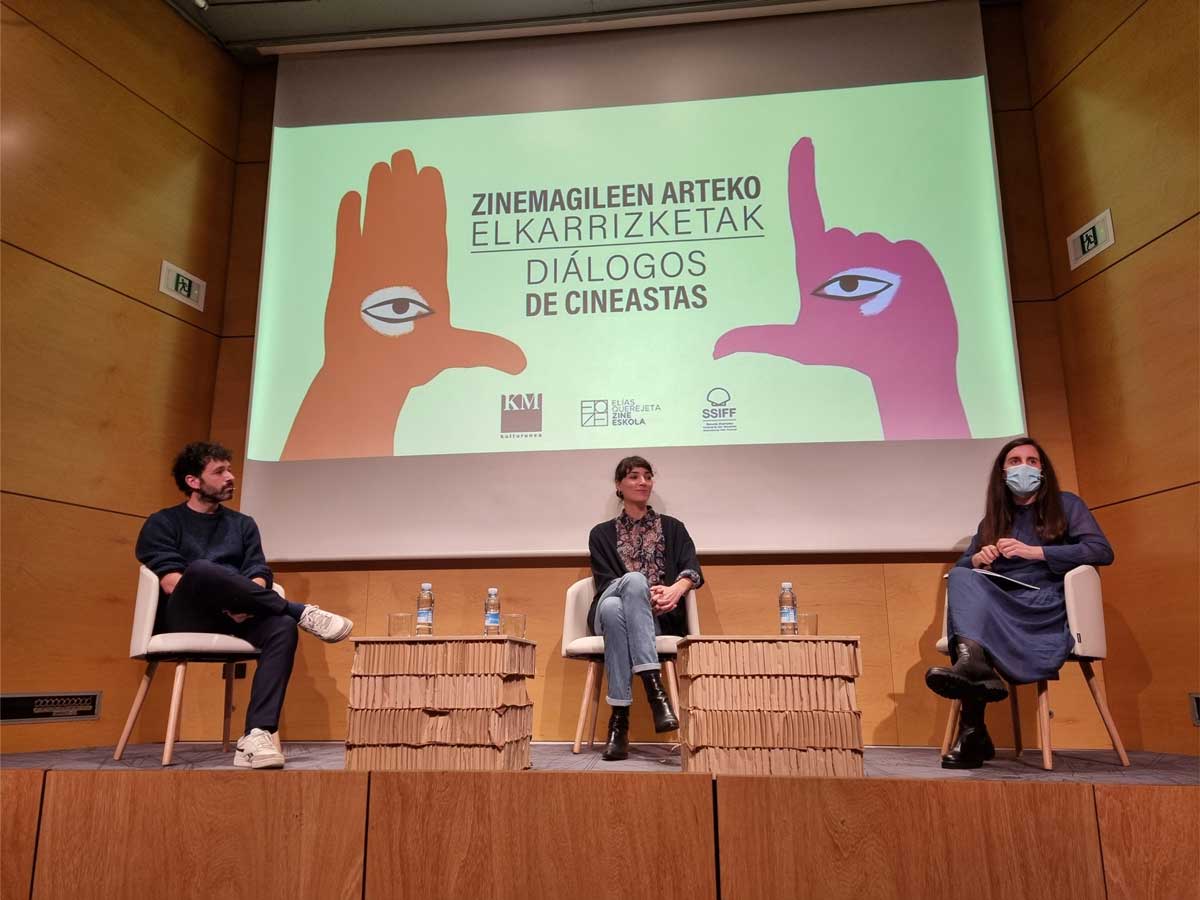
The filmmaker Rodrigo Sorogoyen and the screenwriter Isabel Peña, moderated by Amaia Serrulla (on the right) at one of the Filmmakers' Dialogues in the Koldo Mitxelena centre.
- Amongst the training projects is the Elías Querejeta Zine Eskola itself, a project shared since its conceptualisation and in which the Festival participates in very different ways: from participation in its the academic management and having its own subject going by the name of 'Festival under Construction', to tutoring and accompanying many of the students' projects. Several of the films produced at the Zine Eskola have also participated in a number of the Festival sections: Nest, Zabaltegi-Tabakalera, WIP Europa and WIP Latam. The second training project, in collaboration with the Koldo Mitxelena Kulturunea, is Filmmakers' dialogues, an initiative laying the way for a more relaxed look back at the Basque and Spanish films of the year together with their protagonists and approaching the locals through a training course. The course, which this year welcomed moviemakers including Carla Simón, Iciar Bollaín, Jonás Trueba, Lara Izaguirre and Rodrigo Sorogoyen, will have its second edition towards the end of the year.
- One of these mixed programmes on training and the search for new talents is to be found in the Nest section, co-organised by the Festival and Tabakalera, and taking the shape of a competition for graduation projects by film students all over the world. This section also has a strong educational component thanks to the organisation of ad hoc masterclasses for its participants.
- The most important project development programme is Ikusmira Berriak, co-organised by the Festival, Tabakalera and the Elías Querejeta Zine Eskola and currently, about to run in its eighth edition, one of the international residencies programmes most highly considered by filmmakers thanks to the resources and advisory services it offers. As well as this programme, other ad hoc residencies are now in place such as the one offered jointly with Tabakalera to the winner of the Golden Shell, Dea Kulumbegashvili, and which also led to her participation in the exhibition Vive le cinéma at Tabakalera. Added to these are the Festival's collaboration with Tabakalera's mentoring programmes, the first of which was dedicated to the feature projects of women filmmakers living in the Basque Autonomous Community (Nok) and the series development lab (2deo Serieak).
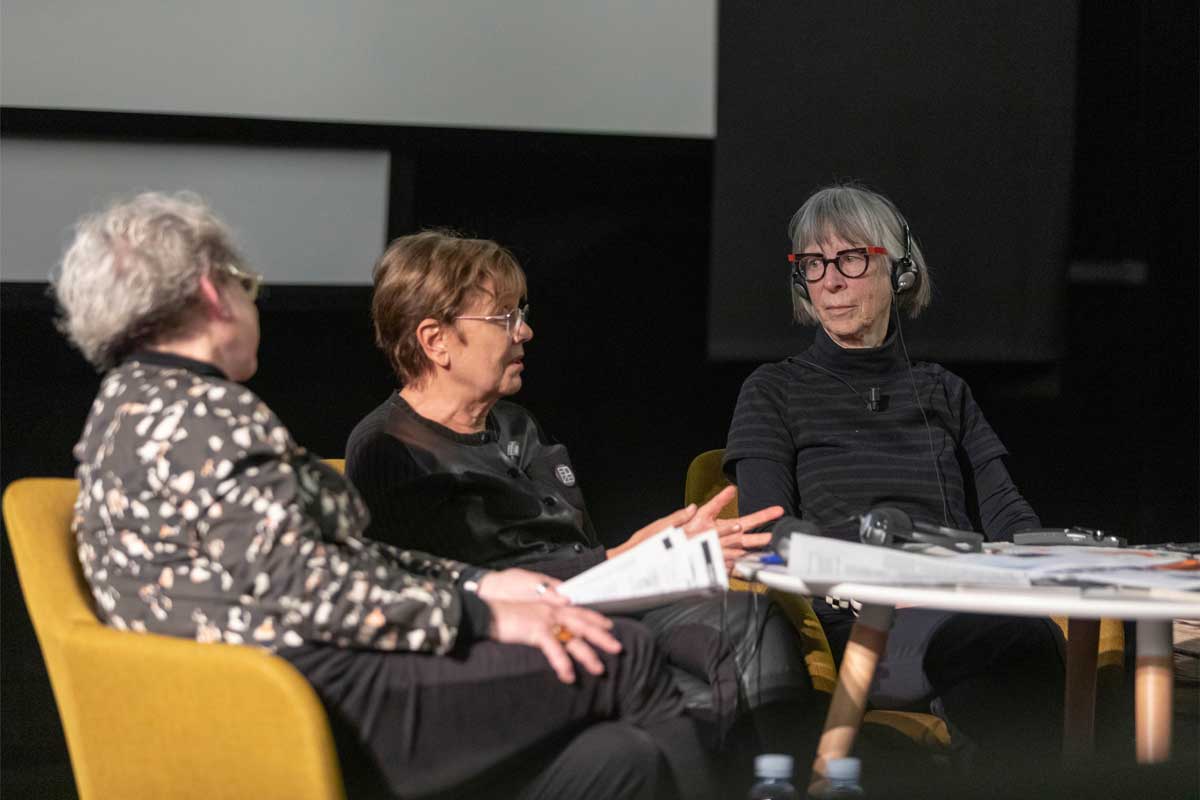
In 2019, the first public programme of Zinemaldia 70. All possible stories, was attended by the distributor and co-founder of Ciné-Femmes International, Vivian Ostrovsky (on the right of the picture), Cecilia Bartolomé (in the centre) and Ana Ureta, member of the Donostia Women's Assembly, to look back at the season of films by women organised by the San Sebastian Festival in 1978.
- Outstanding amongst the research programmes are Z70: all possible stories, designed to study the Festival's historical archive and which runs a number of specific yearly research projects, public programmes and exhibitions.
- Finally, amongst the dissemination programmes are the Festival's participation in the Zinemaldia + Plus focus on Tabakalera's shared screen with a monthly programme of films and strategic projects corresponding to the 'Festival all year round' lines of work, as well as co-organisation and participation in the Editorial Board of Zine, the academic journal of Basque film studies.
After several years of joint work, today we can say that these synergies and collaborative endeavours are now bearing fruit. In the last two years alone many of the movies finished by the men and women filmmakers who have completed the round of the training and development programmes organised by the 'Festival all year round' have screened in the different Festival sections.
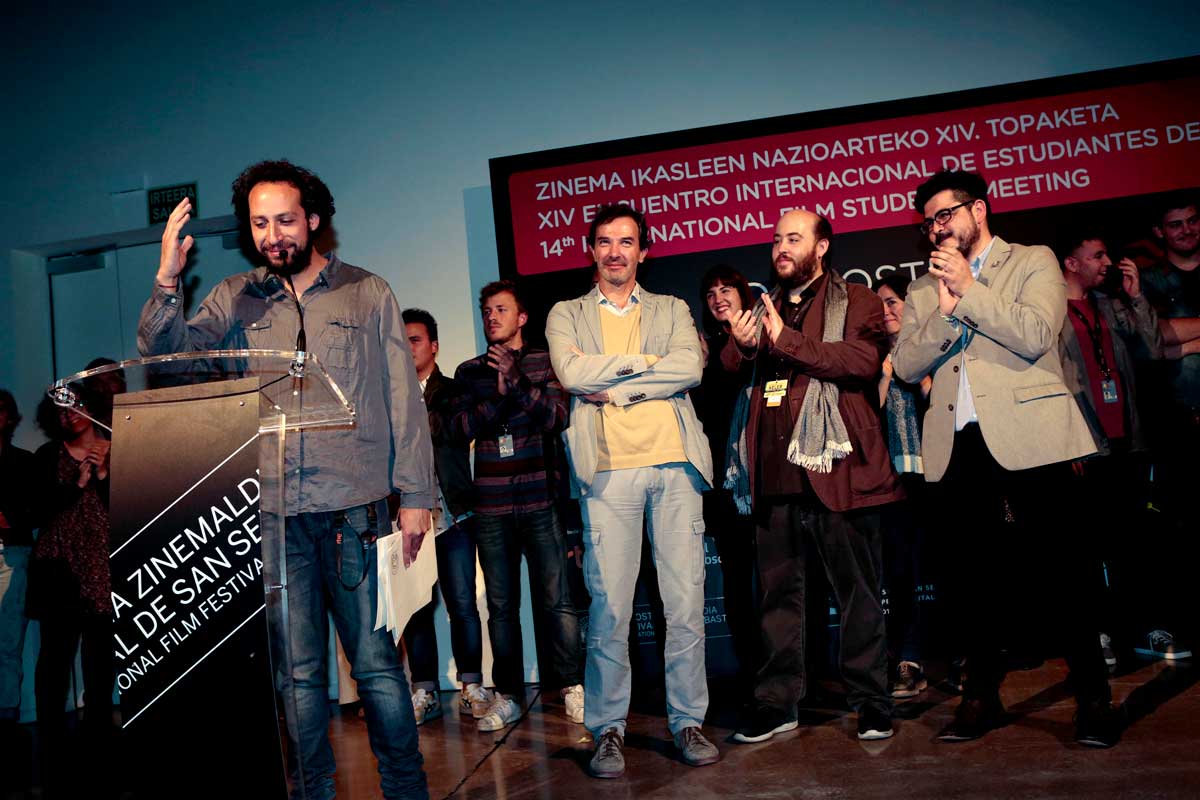
Kiro Russo was one of the participants in the 2015 Nest session with his short film Nueva vida.
This is the case, amongst many others, of Kiro Russo, who started out in the Nest section with the short film Nueva vida (2015), continued working on his feature film as a resident of Ikusmira Berriak in 2016 and finally saw the result premiere in Venice Festival's Orizzonti section and in the Zabaltegi-Tabakalera section of the San Sebastian Festival in 2021. Kiro Russo was also selected to represent his country with his film El gran movimiento (2021). The same applies to another former Nest student (in 2007) Laura Wandel, who represented her country with the feature film Playground (2021), which premiered in Un Certain Regard at Cannes and later screened in Zabaltegi-Tabakalera.
Another success story and witness to the internationalisation of our cinema is that of Arantza Santesteban with 918 gau (2021), a film developed in 2018 at Ikusmira Berriak and which has gone on to harvest major awards at Doclisboa, Torino Film Festival and Punto de Vista. Her first steps in the cinema were also presented as part of the Zinemaldia + Plus focus, with the screening of Euritan (2017), a short film co-directed with Irati Gorostidi, also currently a resident of Ikusmira Berriak 2022 with her film, Anekumen.
A number of tutors who have recently joined the teaching staff at the Elías Querejeta Zine Eskola had also previously completed the shared programmes, such as Jessica Sarah Rinland or Helena Girón and Samuel M. Delgado. The former started to develop her feature film Monólogo colectivo in 2020 as a resident of Ikusmira Berriak and the next year premiered her short film Sol de Campinas (2021) at Doclisboa. For their part, Helena Girón and Samuel M. Delegado were residents of Ikusmira Berriak in 2017, where they developed Elles transportan a morte (2021) which had its premiere last year at the Venice Mostra Critics' Week and later in Zabaltegi-Tabakalera.
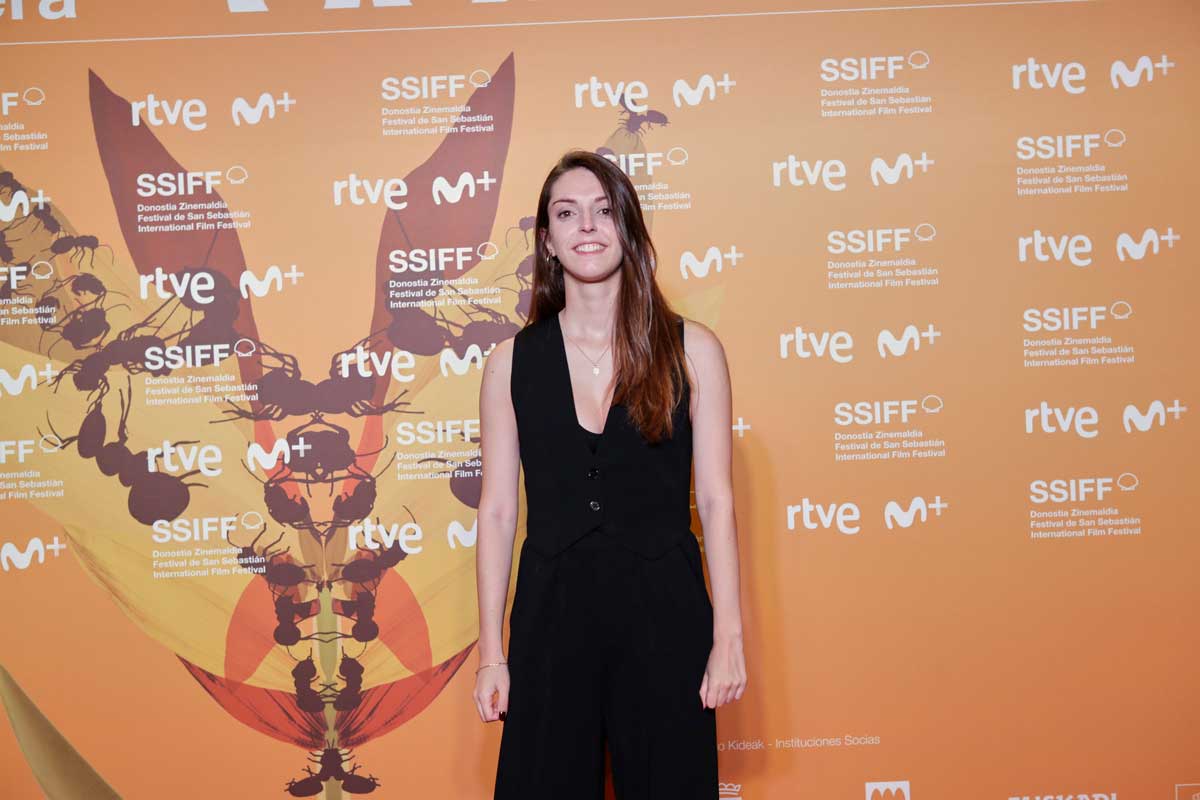
Marina Palacio at the photocall of Ya no duermo (2020), the short film with which she participated in Zabaltegi-Tabakalera.
Not only are the shared programmes providing additions to the school teaching staff, but the students too are living proof of the lovingly planted seeds. Marina Palacio, who developed her short film Ya no duermo (2020) as a student in the first year to graduate from the school was selected in the Zabaltegi-Tabakalera section to return the following year as a resident of Ikusmira Berriak, where she began work on her first feature, Y así seguirán las cosas. She also participated in the Noka programme with the same project. For his part, Jaume Claret, who studied in the same year, premiered his short film Ella i jo (2020) as a representative of the EQZE in the Nest competitive section and is currently a resident at the 8th edition of Ikusmira Berriak with Estrany riu. Both filmmakers, who also work together in the processes and team of the projects produced until now, have taken their shorts to numerous national and international festivals.
Between 2021 and 2022, several Filmmaking students have seen their movies premiere at international festivals, such as Oscar Vincentelli at the FID Marseille with La sangre es blanca and Luiza Gonçalves at the Viennale with Un bananero no es casualidad, in 2021. This year Maria Pugg (O banho), Mario Sanz (Ten minutes to midnight) and Amanda Devulsky (Vermelho Bruto) will see their works premiere at IndieLisboa and FID Marseille.
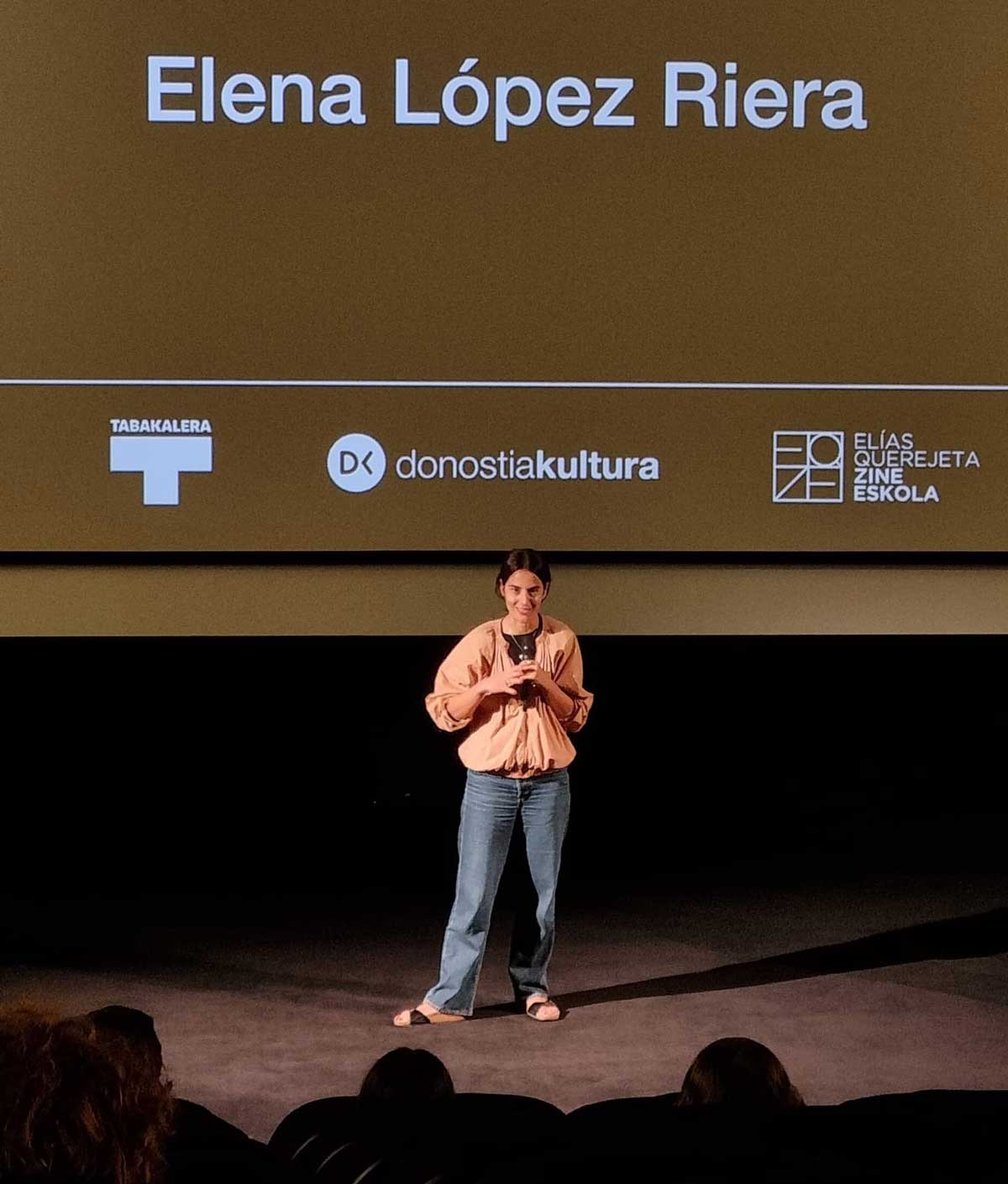
Elena López Riera won the Ikusmira Berria Award in 2018 with El agua, which had its premiere at the Cannes Quinzaine des Réalisateurs and will screen in the Zabaltegi-Tabakalera section of San Sebastian Festival's 70th edition. In the image, during the presentation of her short films at the Zinemaldia + Plus focus.
On the Festival's 70th anniversary, for the first time in its history, two movies developed at Ikusmira Berriak will compete in its Official Selection: Suro by Mikel Gurrea and Pornomelancolía by Manuel Abramovich, residents of the programme in 2016 and 2018 respectively. Joining them this edition is Elena López Riera, who will premiere, following its screening at the Cannes Quinzaine des Réalisateurs, El Agua in the Zabaltegi-Tabakalera section, a film also developed at Ikusmira Berriak in 2018. Elena López Riera has been a project tutor at the EQZE since last year and the Zinemaldi + Plus focus recently ran a complete retrospective of her work as a short filmmaker. Accompanying her in the same section this year is the Basque filmmaker Estibaliz Urresola with her short Cuerdas, premiered at the Cannes Semaine de la Critique following her participation in the Noka programme in 2019.
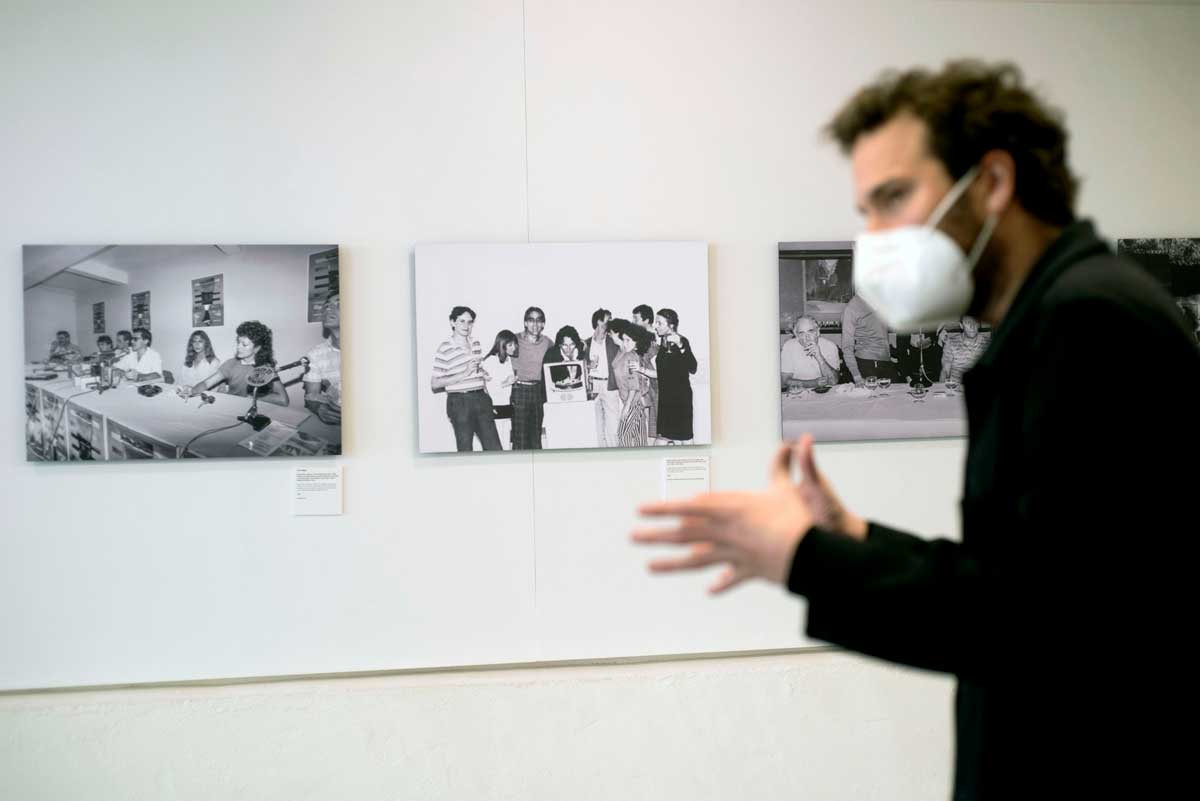
A snapshot from the presentation of 'Festival in transition. The San Sebastian Festival in times of change (1976-1985)', an exhibition curated by the team of the research project Zinemaldia 70. All possible stories.
In the field of research and dissemination, the mutual exchanges between shared projects and programmes are also a reality. In the last two years, in the framework of the Z70: all possible stories project, the Festival and the EQZE have organised in the Kutxa Kultur Plaza two photography exhibitions featuring unseen material from the Festival archives, looking back at its visual history and directing the focus outside the field of action. Meanwhile, in conjunction with the Zinemaldia + Plus focus, the Hungarian film The Lady from Constantinople (1969) by Judit Elek has been recovered and screened. Elek was the third woman moviemaker to compete for the Festival's Golden Shell.
The third recently published issue of the academic journal Zine concentrates on the films of Koldo Izagirre and the bio-filmography of Antxon Eceiza. The deposit in the Filmoteca Vasca of Antxon Eceiza's personal collection has enabled the publication of a dossier coordinated by Maialen Beloki and Irati Crespo, from the Z365 area, with a collection of hitherto unseen material and including letters, handwritten memoires and photographs. At the public presentation of the issue in autumn, the Zinemaldia + Plus focus will screen Ke arteko egunak (1989) the first film in the Basque language to compete in the Festival's Official Selection.
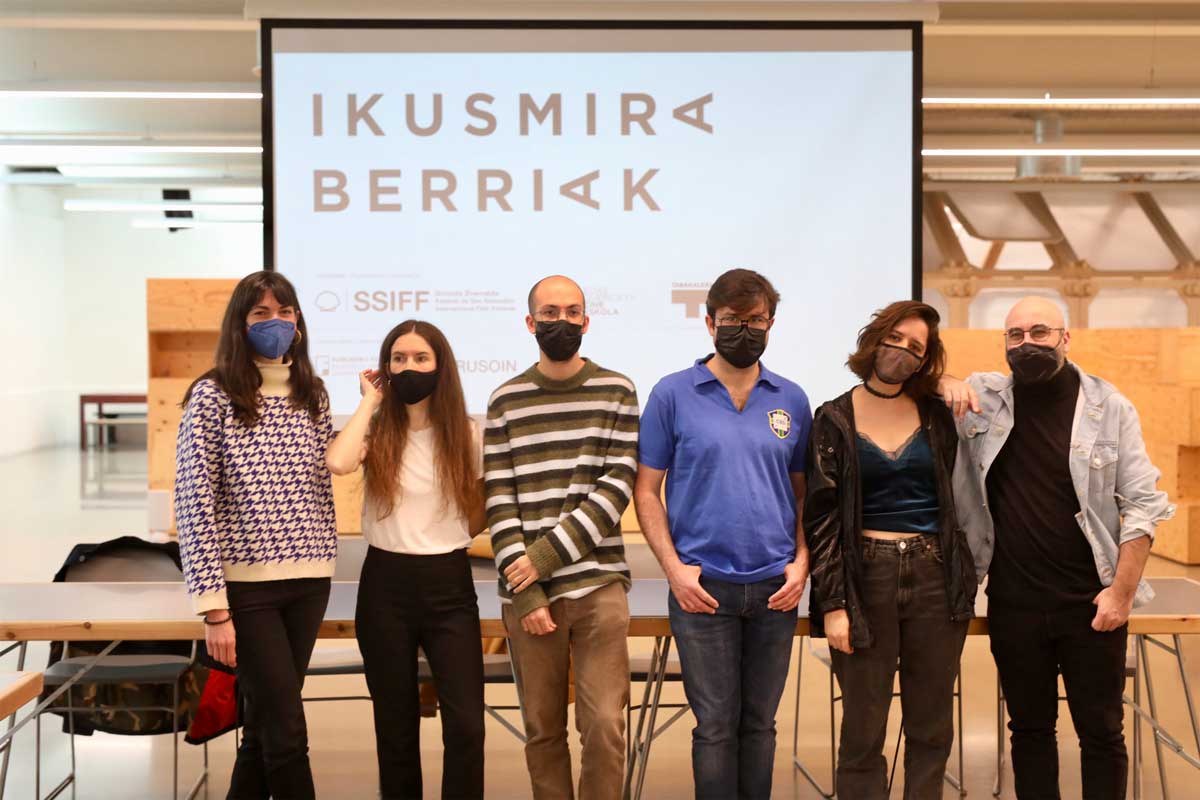
Meritxell Colell, Irati Gorostidi, Jaume Claret, Joâo Paulo Miranda, Ana Cristina Barragán and Maximiliano Schonfeld, residents of Ikusmira Berriak's eighth edition in 2022.
In March this year, the 'Festival all year round' launched a series of networking meetings seeking to combine and interweave the threads of a community which is starting to grow exponentially and needs an extensive network of professional monitoring, care and accompaniment. The first event brought together the current residents of Ikusmira Berriak, the residents of the Noka programme and alumni from the fourth year of students to graduate from the Elías Querejeta Zine Eskola, together with former students from previous years who have established San Sebastian as the base camp for developing their future projects. In September, in the framework of the Festival and making the most of the dates on which the majority of industry members congregate in the city, the second event focused on the community will take place between the Ikusmira Berriak and Noka residents, former and current students of the EQZE, residents of the Madrid Film School's (ECAM) La Incubadora lab and several industry professionals. Amongst the latter will be the heads of training and development programmes at other international festivals.
This will be the perfect setting for the lovingly planted and nurtured seeds to show their results in the shape of thriving talent, where filmmakers, producers, screenwriters and researchers will interconnect to harvest the fruit of the warmth created by a wide-ranging and diverse community.
To be continued…
